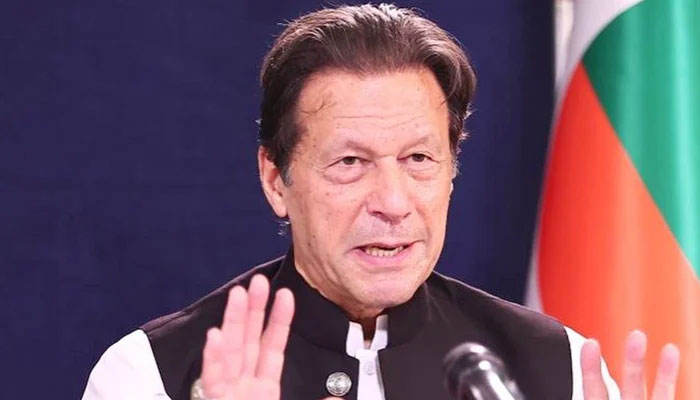Season of talks?
Govt's hawkish elements need to recognise that their rigidity could worsen the current political impasse
Imran Khan has once again turned to his well-worn playbook of populist posturing and brinkmanship. In his latest, he has threatened to launch the ‘first phase of civil disobedience’ by urging overseas Pakistanis to boycott remittances if the government does not meet his demands by today. These demands – release of under-trial political prisoners and the formation of judicial commissions to investigate the incidents of May 9 and November 26 – are predictably contentious but hardly unresolvable through dialogue. Ironically, even as reports suggest that a parliamentary committee may soon be announced to facilitate formal negotiations between the government and the PTI, Imran’s incendiary rhetoric threatens to derail yet another opportunity for political reconciliation. The contradictions within the PTI’s strategy are glaring. On one hand, the party has long maintained that meaningful dialogue should be held only with the establishment, sidelining the elected government. On the other, Khan’s proposed civil disobedience – specifically the remittance boycott – is not only impractical but also deeply insensitive. For most overseas Pakistanis, remittances are not an optional luxury but a lifeline for their families back home. Asking them to withhold financial support in pursuit of political gains reflects either a fundamental misunderstanding of the diaspora’s role or a callous disregard for the well-being of ordinary Pakistanis.
Within the PTI itself, there are voices advocating for a more pragmatic approach. Recent suggestions that the party should focus on building alliances with other opposition groups is a rare, sensible deviation from Imran Khan’s combative style. A united opposition could indeed compel the government to engage in meaningful talks, but for that to happen, the party must shed its habit of behaving like an agitational cult rather than a mature political entity. Meanwhile, the PML-N-led government is also far from blameless. Divisions within its ranks mirror the PTI’s internal discord, with some leaders calling for dialogue while others advocate a hardline stance. The government’s hawkish elements need to recognise that their rigidity could worsen the current political impasse.
The issues at hand – particularly the events of May 9 and November 26 – are serious and merit thorough investigation. However, these matters belong in the courts, not as bargaining chips in political negotiations. By making these incidents conditional to talks, both sides risk undermining the judiciary’s role and prolonging the paralysis that has gripped Pakistan’s political landscape. The larger issue here is the complete absence of a culture of dialogue in Pakistan’s politics. Since the vote of no-confidence against Imran Khan, political observers have repeatedly advised the PTI to engage with the political class rather than isolating itself or relying solely on the establishment. The party’s persistent refusal to follow this advice has contributed significantly to the current stalemate. However, the government’s failure to offer a consistent, credible platform for negotiations has also played its part. For talks to succeed, both sides must abandon their maximalist positions. If this doesn’t happen, the cycle of mistrust and confrontation will continue to undermine democratic processes, leaving the country’s political future in jeopardy. The stakes are too high for this to be yet another season of futile talks. Pakistan’s political class must rise above its divisions, set aside its egos, and finally start behaving like the representatives of the people they claim to serve.
-
 ‘Narcissist’ Andrew Still Feels ‘invincible’ After Exile
‘Narcissist’ Andrew Still Feels ‘invincible’ After Exile -
 Shamed Andrew ‘mental State’ Under Scrutiny Amid Difficult Time
Shamed Andrew ‘mental State’ Under Scrutiny Amid Difficult Time -
 Bad Bunny's Super Bowl Halftime Show: What Time Will He Perform Tonight?
Bad Bunny's Super Bowl Halftime Show: What Time Will He Perform Tonight? -
 Where Is Super Bowl 2026 Taking Place? Everything To Know About The NFL Showdown
Where Is Super Bowl 2026 Taking Place? Everything To Know About The NFL Showdown -
 Chris Pratt Explains Why He And Katherine Schwarzenegger Did Premarital Counseling
Chris Pratt Explains Why He And Katherine Schwarzenegger Did Premarital Counseling -
 Drake 'turns Down' Chance To Hit Back At Kendrick Lamar At Super Bowl
Drake 'turns Down' Chance To Hit Back At Kendrick Lamar At Super Bowl -
 Sarah Ferguson Had A ‘psychosexual Network’ With Jeffrey Epstein
Sarah Ferguson Had A ‘psychosexual Network’ With Jeffrey Epstein -
 Miranda Kerr Shares The One Wellness Practice She Does With Her Kids
Miranda Kerr Shares The One Wellness Practice She Does With Her Kids -
 Czech Republic Supports Social Media Ban For Under-15
Czech Republic Supports Social Media Ban For Under-15 -
 Khloe Kardashian Shares How She And Her Sisters Handle Money Between Themselves
Khloe Kardashian Shares How She And Her Sisters Handle Money Between Themselves -
 Prince William Ready To End 'shielding' Of ‘disgraced’ Andrew Amid Epstein Scandal
Prince William Ready To End 'shielding' Of ‘disgraced’ Andrew Amid Epstein Scandal -
 Chris Hemsworth Hailed By Halle Berry For Sweet Gesture
Chris Hemsworth Hailed By Halle Berry For Sweet Gesture -
 Blac Chyna Reveals Her New Approach To Love, Healing After Recent Heartbreak
Blac Chyna Reveals Her New Approach To Love, Healing After Recent Heartbreak -
 Royal Family's Approach To Deal With Andrew Finally Revealed
Royal Family's Approach To Deal With Andrew Finally Revealed -
 Super Bowl Weekend Deals Blow To 'Melania' Documentary's Box Office
Super Bowl Weekend Deals Blow To 'Melania' Documentary's Box Office -
 Meghan Markle Shares Glitzy Clips From Fifteen Percent Pledge Gala
Meghan Markle Shares Glitzy Clips From Fifteen Percent Pledge Gala




